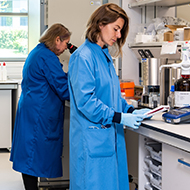
Firms will use transgenic platforms for antibody discovery.
PetMedix has joined forces with Zoetis to develop new species-specific
animal monoclonal antibody therapies (mAbs) using its proprietary transgenic platforms.
Through the partnership, PetMedix will carry out discovery activities against a number of key targets, while Zoetis will have exclusive rights to develop and bring these therapies to market.
Having already brought three novel mAbs to market, Zoetis is a leader in companion animal antibody therapeutics, including fully species-specific antibodies.
PetMedix chief executive Dr Tom Weaver commented: "We are excited to be partnering with Zoetis. Bringing together our unique pet antibody discovery engine with their proven ability to not just develop antibodies, but also make them a commercial success, is set to be a winning combination."
While many technologies have been used to develop human therapeutic antibodies, 40 years of research highlights the benefits of antibodies which are 100 per cent species-matched to the patient.
PetMedix is looking to build on this success for companion animals. Its Ky9™ and Felyne™ platforms were developed in the same way as the leading human transgenic platforms. The collaboration also marks the third publicly-announced deal Zoetis has made with companies using transgenic platforms for antibody discovery.
Zoetis executive vice president and president Robert J. Polzer, said: "At Zoetis, we are committed to continuing our leadership to develop and discover new therapeutic antibodies that can help pets live longer, healthier lives. Collaborating with PetMedix complements our own research and development activities, and we are pleased to be working with them to explore areas of unmet clinical needs in pets."
Image (C) PetMedix.



 RCVS Knowledge has called on vet practices to audit their post-operative neutering outcomes.
RCVS Knowledge has called on vet practices to audit their post-operative neutering outcomes.